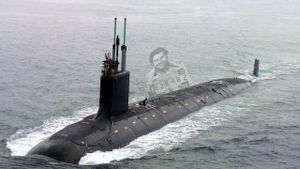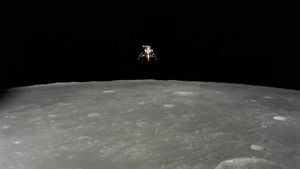North Korea's involvement in the complex dynamics of the Russia-Ukraine war has taken center stage as the nation deepens its military collaboration with Moscow, raising alarms among global observers. The pivot of North Korean troops toward combat operations against Ukraine marks not just a shift in strategy, but also signals the burgeoning relationship between two countries often sidelined on the world stage.
Recent reports from reputable sources confirm the presence of North Korean forces actively engaged alongside Russian troops. Specifically, the U.S. State Department announced on November 13, 2024, the deployment of over 10,000 soldiers from North Korea to the Kursk region of Russia, where they have begun participating in combat operations against Ukrainian forces. This development poses significant concerns for the international community, as the partnership between North Korea and Russia evolves against the backdrop of the lengthy conflict.
State Department deputy spokesman Vedant Patel emphasized the troubling nature of this military collaboration, stating, "We are incredibly concerned by Russia's decision to turn to the DPRK to supply soldiers to continue their brutal war against Ukraine." This concern is compounded by previous intelligence which suggested North Korean forces received training from Moscow on various combat operations, raising questions about their effectiveness and integration within the larger Russian military strategy.
This development is particularly noteworthy as it aligns with the formal ratification of a mutual defense treaty between Kim Jong Un and Russian authorities, which promises military assistance if either nation faces external threats. The connection between these two nations is likely driven by their common interests, particularly as North Korea seeks to leverage Russia's military technology, including missile and nuclear capabilities, which have long been the focus of its defense strategy.
North Korea's regime views its military advancements as key to maintaining sovereignty, especially under continuous international sanctions imposed due to its nuclear ambitions. Recently, the South Korean military reported joint military exercises involving the U.S. and Japan, named the "Freedom Edge." This trilateral exercise serves as both training and reassurance against perceived threats from North Korea, which launched two short-range ballistic missiles shortly before these drills, demonstrating its capability to engage militarily amid increasing tensions.
The overlapping concerns about military readiness and regional stability have prompted Japan, South Korea, and the United States to ramp up defense drills, including aerial and maritime operations aimed at countering potential hostility from North Korea. This military readiness speaks volumes about the existing geopolitical challenges, especially as North Korea continues to expand its missile arsenal and refine its capabilities.
What's more, the issues at play extend beyond immediate military actions. Analysts closely track the technological exchange between Russia and North Korea, particularly the potential transfer of missile technology. South Korean military intelligence suggests advancements seen in North Korea's Hwasong-19 intercontinental ballistic missile might owe some of its technology to Russian assistance. This missile is reportedly capable of reaching the continental United States, though doubts remain about North Korea’s ability to successfully deliver nuclear payloads.
The alignment of North Korea and Russia presents multifaceted issues for global security, as Western nations express increasing concern about the strengthening ties between these two historically isolated regimes. The developments could signify the beginning of renewed collaboration on military fronts, potentially altering the balance of power not only in East Asia but also within the broader international arena.
This recent military engagement has triggered ripples of response from the United States and its allies, as numerous diplomatic talks are expected to follow, particularly at NATO meetings where U.S. Secretary of State Antony Blinken is set to address these heightened military activities.
The strategic importance of these developments cannot be overstated. They place North Korea not only as a potential ally to Russia but also as a new player with stakes deeply rooted in the conflict occurring just beyond its western border. For Ukraine, facing such formidable alliances, the situation demands increased vigilance as the geopolitical chess game continues to evolve.
Consequently, what does this mean for the broader international community? The answer lies within the delicate balance of power as nations navigate the unconventional partnerships reshaping global alliances. North Korea's military operations may represent new norms for interactions between so-called outcast states, blending their ambitions with the strategic maneuvers of established powers like Russia. The ramifications of this collaboration will likely resonate throughout international relations, prompting countless discussions on stability, sovereignty, and the balance of military forces.



